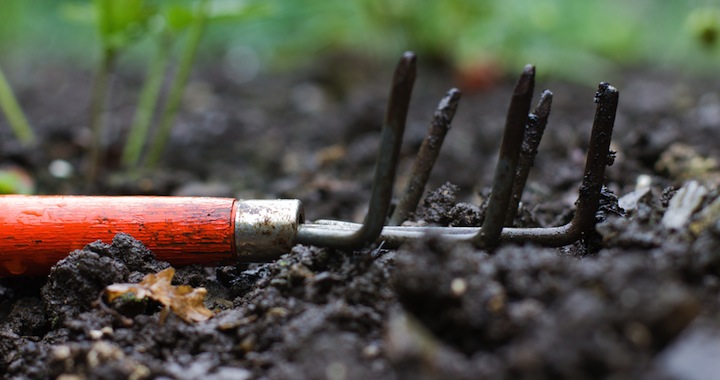It’s summer, and once again my fingernails are a wreck. I’ve got a quarter-inch gash hanging slanted off my pointer finger cuticle, like a bloody Q sign. My left thumb looks like it got into a fight with a mallet and lost. (It did.) The dirt under my fingernails is about to sprout mushrooms.
Yeah, I admit it. I love getting dirty with Jesus.
From Adam to Abraham to Jesus, I come from a long line of gardeners. The first commandment to humanity was to take care of the garden. Abat and shamar.
Serve and protect. From Genesis 2:15 to third millennia America, our first duty is to be good stewards of God’s creation.
Solomon, the wisest man who ever lived, “made gardens and parks and planted all kinds of fruit trees in them” (Ecc 2:5-6), in reverence for God, the Eternal Gardener. The Lord also commanded us to care for our neighbors, particularly the least among us. My husband and I have a particular heart for finding places where these two mandates—to care for and tend the Garden, and to care for our poorest neighbors—intersect. So we were excited when a woman came over after a creation care workshop to share an idea that I had never heard before.
She belongs to a garden club. Immediately, the stereotype of an upper-middle-class woman with a penchant for peonies and antique roses came to mind—a woman much like me before my husband Matthew quit being a doctor and we began our spiritual and environmental journey. But this woman shattered my preconceptions.
A friend of hers is involved with an inner-city ministry for women. They run a home for about twelve recovering addicts. These women are separated from children and family, without hope—exactly where so many of us finally find Jesus. The director of the recovery center had a dream to transform the patch of ground out back, enclosed by a dilapidated metal fence, into a place for rest, restoration, and renewal—a peace garden—but she did not have the knowledge or resources to make her vision a reality.
That’s where my new friend came in. Recognizing a need and a chance to serve, this woman approached her garden club. The group, which had never considered any project like this before, embraced the idea with enthusiasm. And now, as they prepare to design, plant, and tend a beautiful garden space, her hope is that this project will serve as a model for others who want to garden with Jesus.
Imagine if we all found ways to use our God-given passions to care for the earth while caring for the poor? A minister friend just told me that his congregation is planning a community garden right on the church grounds to serve two neighboring low-income projects. They also want to build a nature path around the perimeter of the property for the community to use.
Another group of friends has tilled an abandoned inner city lot next to an old Episcopal graveyard. One hundred years ago, African Americans were barred from being buried in that cemetery. Now people of all races are working the earth together, sharing some of their produce with an afterschool program in this economically challenged neighborhood where unemployment hovers around thirty percent.
A friend in Texas is helping schools in her low-income neighborhood xeriscape their grounds with indigenous plants and natural landscaping. A California minister has helped plant over a million saplings in Madagascar. Our friends at A Rocha in England turned a dump into a model garden where they teach inner city kids about God’s green earth.
These servant-gardeners remind me of one of my favorite passages in the resurrection story. When Mary goes to pay her respects at the tomb and finds it empty, she turns around and sees a man. It is Jesus, but at first glance she mistakes him for a gardener (John 20:15).
Rembrandt immortalized this mistake that is not a mistake—for Jesus is indeed the new Adam—in a painting of Mary at the tomb. Jesus is depicted wearing a floppy gardener’s hat with a shovel in hand and knife in his belt. I feel certain that if Mary looked very carefully, she would have seen that Jesus the Gardener had dirt under his fingernails.
Isn’t it time we all started getting a little dirty with Jesus?
Getting Started
Follow Jesus’s advice in Matthew 7 and get the plank out of your own eye before worrying about the speck of dust in your neighbor’s eye. Here’s some ways to become a better steward in your own backyard.
At home:
- Plant a vegetable garden
- Only water the lawn and garden in the morning or evening
- Compost lawn and food waste
- Mow the lawn higher and less frequently
- Can, freeze, or dry locally grown fruits and vegetables
- Use reclaimed water (bathwater, dishwater, rain barrel) to water plants
- Integrate native plants into landscaping and gradually reduce lawn size
- Stop using chemicals in the lawn and garden
- Trade in your gas-powered lawn mower for a manual reel or solar-powered mower
In the community:
- Organize a church or community garden
- Start a plant exchange
- Share your skills: teach children or marginalized teens the miracle of gardening—and the miracle of all God’s creation
- Organize a trip to a gathering, like Summoned Toward Wholeness: a Food and Faith Conference (https://divinity.duke.edu/summoned).
—-
Nancy Sleeth is the co-founder of Blessed Earth, a faith-based environmental nonprofit. Nancy is author of You might also want to check out her husband’s newest book, 24/6: Prescription for a Healthier, Happier Life by Matthew Sleeth, MD.
Ads by Google

